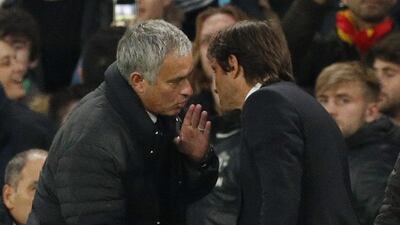All eyes were on the opposition dugout.
Jose Mourinho, returning to Stamford Bridge for the first time since his acrimonious exit last December, was always going to the focus of attention when his former employers Chelsea hosted his current ones Manchester United, with the Portuguese struggling to keep his emotions in check as he embraced John Terry on the sideline before kick-off.
It did not take long for any lingering sense of sentimentality to give way to exasperation.
Just 30 seconds were on the clock when Pedro took advantage of some slack defending to give Chelsea the lead and Mourinho a major problem: just half a minute after the first whistle, the United boss’ game plan lay in tatters.
More Premier League
• Results & round-up: Mourinho and Terry all smiles, then Chelsea are all insult
• Richard Jolly: Let's not talk crisis, but – Pep Guardiola's Man City are idealists with practical problems
• In pictures: Antonio Conte's Chelsea pile on Jose Mourinho's Manchester United in epic rout
The visitors’ approach at Stamford Bridge was always likely to be similar to the one they employed against Liverpool last Monday, when United successfully nullified a rampant attack and left Anfield with a point.
There was no room in the strategy for conceding within the first minute, however, and Mourinho’s men looked unsure of themselves following Pedro’s opener.
Chelsea had a clearer idea and were also stronger and sharper than their opponents, quicker to loose balls and more incisive with their passing in the final third, with United second best right across the pitch for the majority of the encounter.
Wing-backs Victor Moses and Marcos Alonso did an excellent job of forcing Marcus Rashford and Jesse Lingard deep into their own half, cutting off United’s most likely source of a counter-attacking threat, while N’Golo Kante stuck tight to Paul Pogba and prevented the world’s most expensive player from getting on the ball and making things happen.
The second goal, scored by Gary Cahill after United failed to clear Eden Hazard’s corner, gave Chelsea a greater degree of security, with the hosts then opting to sink back into their own half and form a low defensive block which United found difficult to penetrate.
The pace of Moses and Pedro, the skill of Hazard and the running of Diego Costa ensured they retained the capacity to cause United problems at the other end, though, with Hazard and Kante getting in on the act with two well-taken second-half efforts.
It was a terrific demonstration of astute game-management from Antonio Conte, whose tactical acumen should not be overshadowed by his fabled intensity and eye-catchingly effervescent manner on the touchline.
Many members of the Stamford Bridge faithful blamed their side’s players for Mourinho’s departure 10 months ago, expressing regret at the perceived injustice of the club’s most successful manager bearing the brunt of the blame for Chelsea’s dismal start to the season.
Few of the home fans leaving the ground on Sunday are unlikely to want to swap Conte for Mourinho now.
That it is not to say that the two-time European champion and eight-time league title winner has suddenly become a bad coach or is past his sell-by date, but Chelsea certainly look far more cohesive and balanced under their new manager than United do at present.
“You’re not special any more,” a handful of Chelsea supporters sang at their former hero, favouring a slightly less nuanced interpretation.
All eyes were on the opposition dugout to see if there would be a reaction. Mourinho, much like his team, had no answer.
sports@thenational.ae
Follow us on Twitter @NatSportUAE
Like us on Facebook at facebook.com/TheNationalSport

